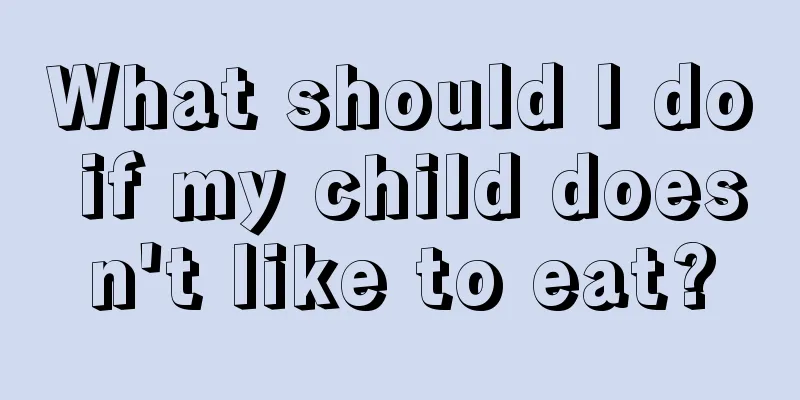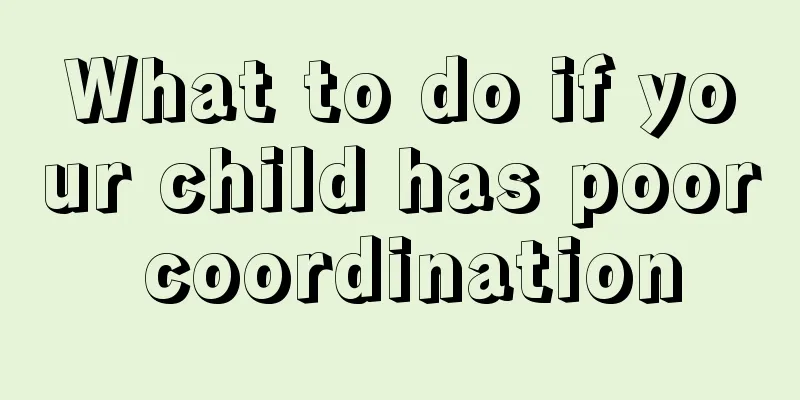What should I do if my baby falls and has convulsions?

|
Everyone knows that children are generally more naughty and it is inevitable that they will bump into things. Some babies experience convulsions after falling. This situation is most likely caused by insufficient blood supply to the brain, but it may also be caused by epilepsy. Parents should pay attention to it and take the baby to the hospital for relevant examinations in time. Let the baby pay more attention to rest. If it is caused by epilepsy, it must be treated in time. What are the symptoms of epilepsy in children 1. Minor mealtime epileptic seizures: Some babies often drop bowls, spoons, etc. on the ground when eating. The duration of the epileptic seizure is not long, and some only last for a moment. However, many careless parents think that this is caused by the baby's negligence, so they do not pay attention to it, let alone treatment. 2. Sudden vomiting: When the baby is playing games or doing something else, he vomits without warning, and continues the activity after vomiting for a few minutes, as if the one who just vomited was someone else and not himself. Faced with this phenomenon, many parents mistakenly believe that there is something wrong with the baby's gastrointestinal tract. 3. Crying and laughing at random: When the baby is young, it is normal for him to cry and laugh at the same time, so many parents and friends do not pay attention to it and think that the baby is just playing. What they don't know is that babies won't laugh for no reason and then suddenly stop. This symptom indicates that the baby is very likely to have epilepsy. 4. Reflex attack: Some babies' mouth corners twitch involuntarily when they are talking. If the baby keeps talking, this symptom will become particularly obvious. At the same time, this phenomenon only occurs when the baby is talking, not when the baby is silent. Causes of epilepsy in children ① Congenital brain malformations, such as lissencephaly, pachygyria, polymicrogyria, gray matter heterotopia, brain perforation, congenital hydrocephalus, corpus callosum dysgenesis, arachnoid cysts, microcephaly, megalencephaly, etc. ② Neurocutaneous syndrome: Common ones include tuberous sclerosis, neurofibromatosis and cerebral trigeminal angiomatosis. ③Genetic metabolic diseases, such as phenylketonuria, hyperammonemia, cerebral lipidosis, vitamin B6 dependence, etc. ④ Perinatal brain damage, mainly birth trauma, asphyxia, intracranial hemorrhage, hypoxia, and ischemic encephalopathy, among which hypoxic-ischemic encephalopathy leading to epilepsy is the most common. ⑤ Intracranial infection: such as bacterial meningitis, viral encephalitis, brain abscess, fungal meningitis, brain parasitic diseases, post-vaccination encephalitis, post-infectious encephalitis, etc. ⑥ Nutritional metabolic disorders and endocrine diseases, common ones include hypoglycemia, hypocalcemia, hypomagnesemia, vitamin B6 deficiency, and hypothyroidism. ⑦ Cerebrovascular disease: such as cerebral vascular malformation, intracranial hemorrhage, cerebral vasculitis, cerebral infarction, etc. ⑧Trauma: Intracranial hemorrhage, skull fracture, cerebral contusion, etc. caused by trauma can all cause epilepsy, but the incidence rate is related to the degree and location of the injury. |
<<: How to treat lumbar herniation in children
Recommend
What to do about growing pains
Growing pains refer to the pain that our babies f...
Can keratitis in children be cured? How to prevent it?
Keratitis is mostly caused by bacterial infection...
The child suddenly complained of pain on the right side of his face in the middle of the night
Children like to eat random food, especially swee...
What is the most suitable temperature for babies to drink water?
After the baby is born, many mothers are in a pan...
Why does the baby's hair grow vertically?
Parents all hope that their children have black a...
Baby has fever and low white blood cell count
When your baby has a fever, if the white blood ce...
What should I do if my child has warts on his hands?
If a child has warts on his hands, parents should...
How to deal with a baby having a fever and convulsions
We all know that convulsions are a disease, but s...
What should I do if my child has a lot of eye mucus when sleeping?
As children grow up, parents will certainly caref...
How to treat a 17 month old child’s fever?
Nowadays, any topic about baby's illness will...
My baby's ears are swollen, what's going on?
There are many reasons for swollen ears, the most...
How to treat popliteal cysts in children
Children's physical health is very important,...
How to cure a child's stuttering?
I believe that many parents want to know how to t...
Red pimples on children's body are very itchy
When children are young, their bodies are not ful...
Why does a child's nose bleed while sleeping?
Water is an essential substance for the human bod...









